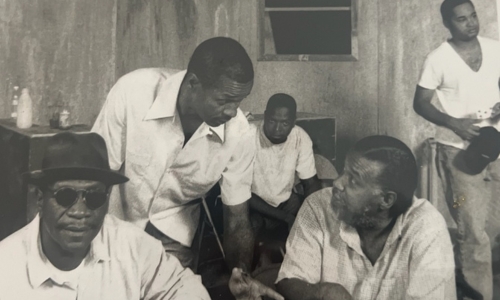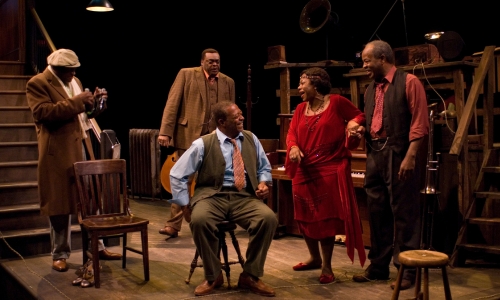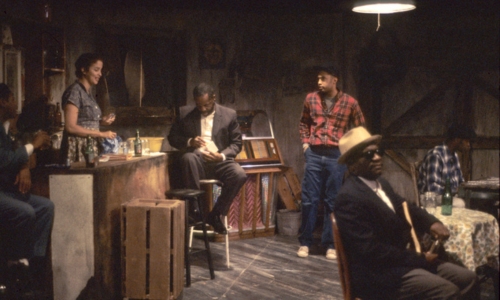“We All A Part of It. Links … in the Food Chain”: Racial Capitalism in Eugene Lee’s East Texas Hot Links
While East Texas Hot Links was originally produced in 1991, it continues to enthrall and inform audiences today. Through Lee’s continuous weaving of the human food chain, he projects how Black Americans are exploited at an excessive rate and are “destined to be dinner” for those who dine at the top of the chain – white capitalists.
Before examining Lee’s representation of the “food chain,” it is first important to consider racial capitalism. In her article, “Racial Capitalism” in the Harvard Law Review, Professor Nancy Leong describes it as the system by which economic and social value are determined by race; in this system, the individual inevitably becomes a commodity. Their racial identity can be literally and metaphorically priced, exchanged, or replaced. Consequently, they become stripped of any sense of self and exist in the capitalist system as a product. Works critiquing racial capitalism – such as Professor Kyla Wazana Tompkins’s article “‘Everything ‘Cept Eat Us’: The Antebellum Black Body Portrayed as Edible Body” – often refer to the mass “dehumanization of African Americans in the slave economy,” where the “slave-trader […] descend[ed] into crass appetite and consumption.” Although slavery was legally abolished in Texas in 1865, Lee showcases how racial capitalism continued to reestablish itself long after.

In East Texas Hot Links, which is set in 1955, the commodification and dehumanization of Black bodies are introduced by the character Adolph, who expresses how “We all a part of it. Links … in the food chain,” where Black Americans are branded as “colored meat.” Here, the separation of “Links” seems intentional, as it prompts the audience to recollect the play’s title: East Texas Hot Links. Hot links are a type of sausage, playing into Adolph’s food chain analogy. Through this imagery of being “link[ed]”, it seems to speak to the slave-trade economy and the chains of the slaves themselves, taking Adolph’s analogy a step further.
By branding the bodies as “meat,” Lee establishes a predator/prey relationship and warns that the “white man will feed off you til ain’t nothin’ left.” Such extensive consumption feeds into what Professor Frank B. Wilderson III refers to as “parasitic capitalism” in his book, Afropessimism. Here, Wilderson argues that “human capacity […] is violently parasitic on Black flesh,” meaning that, under capitalism, Black people “suffer as the hosts of Human parasites, though [the parasites] themselves might be the host of parasitic capitalism.” Therefore, when the human parasite latches on, parasitic capitalism concurrently clings on. When applying this concept to Lee’s play, the white boss managing the construction of a nearby highway is both parasite and host. He latches onto and derives value from the Black characters and their labor, as they reveal that their families have “been workin’ for the same ugly white man since he was a ugly white baby.” The continuous experience of being fed upon throughout one’s entire lifespan – from the parasite’s transformation from baby to man – exposes the static racial hierarchy that exists alongside the seemingly dynamic consumption by the parasite. Such descriptions highlight not only the continuous – yet rapidly vicious – cycle of parasitic capitalism, but also the excessiveness of its consumption; the single white boss, the parasite, feeds off numerous Black workers. Consequently, it becomes apparent that the commodification and parasitic consumption of Black labor is based on greed rather than necessity.

There becomes an eventual point when the consumer is full and the Black characters are considered leftovers. This disposal of the Black body is employed by August Wilson in his 1985 play Ma Rainey’s Black Bottom. In my own personal interview with Eugene Lee, he identified Wilson as a mentor with great impact on his writing and storytelling; an intrinsic piece of advice that Wilson gave to Lee was to “let [his characters] talk” as “the words will do the work.” This seems to have inspired Adolph’s monologues in East Texas Hot Links uncovering the food chain – they noticeably mirror those of the character Toledo in Ma Rainey’s Black Bottom. Although Wilson’s play is set in 1927 Chicago, Lee expands the “[B]lack-body-as-food trope” (as described in Leong’s aforementioned article, “Racial Capitalism”) to East Texas in 1955, enforcing its prevalence almost three decades later.

Like Adolph, Toledo delivers an important monologue that expresses similar themes of commodification, consumption, and parasitism: “The white man knows you just a leftover. ’Cause he the one who done the eating […] Done went and filled the white man’s belly and now he’s full and tired and wants you to get out the way.” Like in East Texas Hot Links, the Black body is reduced to leftovers and dismissed after fulfilling its purpose: “fill[ing] the white man’s belly.” Many critics argue that Toledo’s speech is a crucial element of the play, as it exposes the vicious consumption of Black Americans and how they are forced into “passivity and muteness” as they become leftovers. However, critics often fail to address the double entendre of the word “leftover”: both something that has been left behind, but also – more crucially – a remnant of the past. In the article “‘We’s the Leftovers’: Whiteness as Economic Power and Exploitation in August Wilson’s Twentieth-Century Cycle of Plays”, Professor Çiğdem Üsekes argues that – despite the attempt of “mut[ing]” Black voices through consumption – the “leftovers” in both Wilson’s and Lee’s plays exist as remnants and reminders. These leftover characters have ultimately survived; they escaped their fate of being trapped in “the white man’s belly.”
This is incredibly significant to two of the characters in East Texas Hot Links: Delmus, the youngest, and Adolph, the oldest. Both the “old sage” and the “youngblood” show that past experiences in East Texas can survive, whilst the hope for a better future remains. The two work hand in hand. The “leftovers in [Adolph’s] head” in East Texas Hot Links protect the stories of the past so we can learn from them, in an attempt to achieve a better future for the next generations. Lee consequently finds value in being a leftover: it is they who preserve, but also work to improve, the Black experience in East Texas.
Olivia Rumbold is a recent graduate from the University of Exeter (July 2024) in the United Kingdom, with a degree in English with proficiency in French (BA Hons). During her final year, she selected the module ‘Harlem and After: African American Literature 1925-Present,’ which ultimately inspired her to research African American literature further. In doing so, Olivia came across the work of Eugene Lee, who became the subject of her undergraduate dissertation: “‘I’ve Got More Diggin’ to Do’: Diggin’ Up Truths and Buryin’ the Lies in East Texas through the Plays of Eugene Lee.” Olivia is now eagerly awaiting her trip to Court Theatre to see Lee’s East Texas Hot Links live on stage.